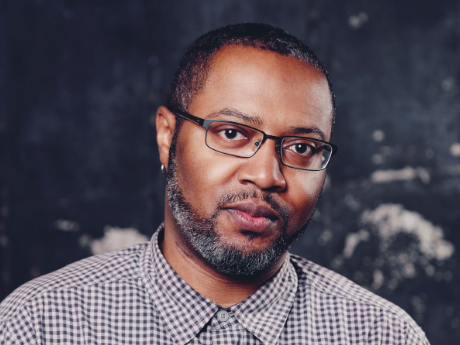In Their Own Words
Mitchell L. H. Douglas on “O-H-I-O”

O-H-I-O
Your welcome
to the neighborhood
is the Crips killing a Dozen
Cousin 2 blocks down
from the townhouse
you just moved into, shot-
guns & shells
@ the community center
where you will take swimming lessons, sink
like a Midwest boy
out of time. This
after punk rock & bitter beer
in a church basement, bodies
slamming against each other as if dying
to be whole. This
after you are fresh
from cornfields, the silk
still in wisps
behind your ears.
Years drift, & you curse
Columbus, wonder
Little Paul, Ray,
Stacy, Special K, the West
High good times crew.
Who is rotting
in the belly, who dared take
another bite, who
got past probation
officers visiting @ lunch time,
who endured the shaking
hand, the gat they had to grip
after school? Who can read
any of this, rise,
say I?
On "O-H-I-O"
My moves as a child—from Kentucky, to Iowa, to Ohio, and back to the bluegrass—carved a triangle through the Midwest and South, each place a new side to my voice that shaped my tongue and the black alphabet that made me poet.
Consequently, I've had a strange relationship with Ohio for many years. When I was 14, my family moved to Columbus from Iowa City when my father took his first post-Ph.D. teaching job at Ohio University in Athens. When we arrived, the story that dominated local news was the death of a teen at a popular community center. Allegedly, the teen was a gang member killed by a rival. His murder happened in our near-east side neighborhood just blocks from our new home. It was the summer before my freshman year of high school, and we had just left a city I had grown to love for one I didn't understand.
I was beyond awkward and far out of my element: the kid who frequently made straight A's and did all his homework at school, the one who's lone act of rebellion was skipping ninth period study hall for jaunts to buy punk records at shops on High Street near Ohio State. The guys who were bussed with me from the east side to West High took me under their wing. Most of them weren't in gangs, but they knew everything about them (including which ones were at our school). It was an act of kindness I will never forget, like something about being from the same streets and enduring that long bus ride meant more than our differences. My teachers may have objected, but these friendships kept me in the know—and safe.
As the manuscript that would become dying in the scarecrow's arms assembled itself, my poems about police violence against brown people on a national scale naturally turned to issues of violence in the Midwest. I wrote about my now (Indianapolis) and my past (Columbus). In the process of completing the book, I went back to my old neighborhood, my old high school, and the community center where the young man lost his life. Additionally, I've tried to make peace with "O-H-I-O": a poem whose title is derived from a popular chant associated with OSU, one that calls on revelers to spell the name of the state with the twist and bend of their bodies. I no longer hold grudges for the cloud of violence that shadowed our short time in Columbus and offer these lines in peace.



